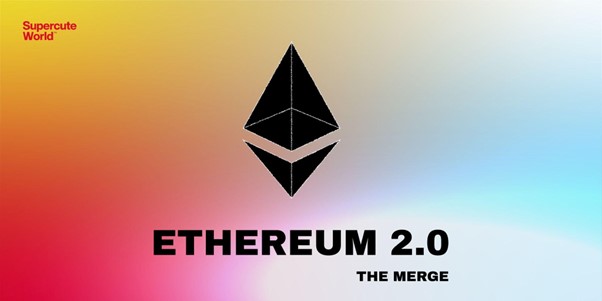One of the most significant events in the history of cryptocurrency is finally expected to happen this week. Ethereum’s major software upgrade, called The Merge, will fully transition the blockchain platform from its current proof-of-work consensus mechanism to the proof-of-stake model. Ethereum is expected to continue on as normal, only now it will be verified using PoS instead of PoW for authenticating crypto transactions.
According to Ethereum.org, “The Merge represents the joining of the existing execution layer of Ethereum (the Mainnet) with its new proof-of-stake consensus layer, the Beacon Chain. It eliminates the need for energy-intensive mining and instead secures the network using stakes ETH.”
The Merge aims to address three main areas of concern: sustainability, scalability and security. The new system not only sets the stage for future scaling upgrades including sharding but also drastically reduces Ethereum’s energy usage by more than 99% because miners will no longer have a financial incentive to run computers around the clock, according to researchers at the Ethereum Foundation.
The transition from proof-of-work to proof-of-stake is also expected to further deliver changes to the NFT market. The Merge has the potential to increase the diversification of Ethereum and revamp the tokenomics of the entire market and potentially see an increase in NFT’s pricing.
The majority of NFTs are part of the Ethereum blockchain, and many people are excited about the transition since it is expected to reduce energy consumption, meaning users will be able to mint and sell NFTs in a more sustainable way. However, with all significant technical upgrades, some users fear there may be the potential for scams, hacks, volatility and confusion.
Are your NFTs safe?
There may be confusion over which assets are “official” or “genuine” since duplicate NFTs will exist due to the ETH proof-of-work chain and other potential forks.
When the merge is complete, at least one proof of work (PoW) fork of Ethereum is expected to live on, potentially creating the risk of creating two versions of NFTs. Thus, NFT owners may face an issue called a ‘replay attack’. This is when a transaction is completed on one blockchain, and repeated on another.
The largest NFT marketplace, OpenSea, and prominent brands like Yuga Labs, the creator of the Bored Ape Yacht Club, have publicly stated they will not support the duplicate versions of NFTs that exist on these chains. Proof, the startup behind Moonbirds NFT project, also expressed a similar stance and maintains it will not support or recognize any fork made post-merge.
In just a few days, the Merge will become the demarcation event that separates PoW-era and PoS-era NFTs. Ethereum-based SELFi3S™ NFT collection by Supercute World™ will be one of the first to launch during Ethereum’s new phase, and has partnered with Web3 developer platform, Alchemy, to power the upcoming project as well as highlight the company’s new full stack NFT development capabilities.
“Our mission has always been to bring web3 to a billion people, and we see NFTs being a critical driver of that adoption,” said Nikil Viswanathan, cofounder and CEO of Alchemy. “To help achieve that goal, we’ll continue to invest in our full-stack NFT development offering, and support creative and exciting new projects like Supercute World.”
SELFi3S™ by Supercute World™ is the first truly inclusive NFT project that allows participants to create and represent the best versions of themselves online by offering the following versions: male, female and gender neutral. Holders will be able to choose the best version of themselves without ever affecting the rarity score.
Supercute World’s upcoming collection of 7,777 SELFi3S is expected to launch in October. To stay up to date and learn more about Supercute World™, visit the website and follow the project on Twitter.




